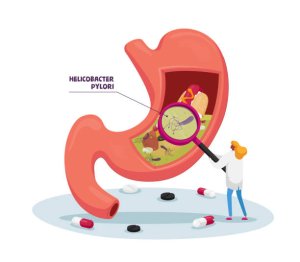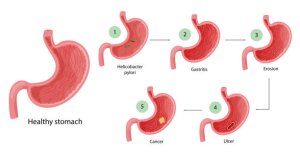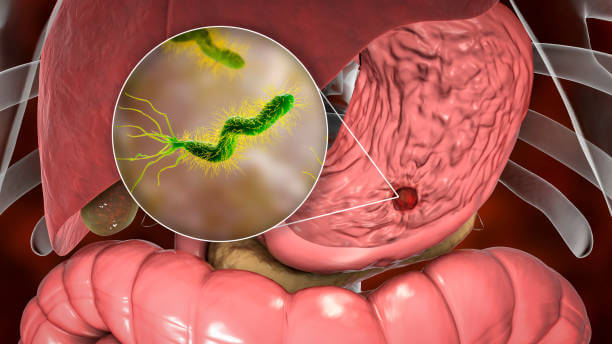Helicobacter pylori is a common type of bacteria that can infect the stomach and duodenum. It is a leading cause of ulcers and can also cause gastritis and stomach cancer. H. pylori is spread through contaminated food and water, and can be passed from person to person through close contact. The bacterium is difficult to eliminate, and many people who are infected never develop any symptoms. H. pylori is treated with a combination of antibiotics and acid-reducing medications. In some cases, surgery may be necessary to remove the bacteria from the stomach.
1. Helicobacter pylori is a type of bacteria that is often times hard to get rid of.

Helicobacter pylori, or H. pylori, is a type of bacteria that can infect the stomach and duodenum, which is the upper section of the small intestine. This infection often leads to inflammation of the stomach, and can even create ulcers in the lining of the stomach or duodenum. H. pylori is a resilient bacteria, and can often times be hard to get rid of. H. pylori is spread through contaminated food and water, and can even be passed from person to person. The bacteria attaches to the lining of the stomach, and often times causes an infection. Symptoms of an H. pylori infection can include stomach pain, bloating, burping, weight loss, and nausea. H. pylori can be diagnosed through a stool sample, blood test, or a biopsy of the stomach. Treatment for H. pylori often includes a combination of antibiotics and acid-reducing medications. In some cases, surgery may be necessary to remove the bacteria. H. pylori is a common infection, and is often times present without causing any symptoms. However, it is important to treat the infection as it can lead to serious complications such as stomach ulcers.
2. Helicobacter Pylori bacteria can cause stomach ulcers and even cancer.

Helicobacter pylori, or H. pylori, is a bacterium that lives in the stomach and can cause gastritis, ulcers, and even cancer. H. pylori infection is common, and about half of the world’s population is infected with the bacterium. Most people with H. pylori infection do not have any symptoms, but some people may experience stomach pain, bloating, burping, or nausea. H. pylori is spread through contact with infected saliva, vomit, or feces. The bacterium can also be spread from person to person through close contact, such as kissing or sharing utensils or cups. It is also possible to contract H. pylori from contaminated food or water. H. pylori infection is treated with antibiotics. In some cases, two or more antibiotics are used together to kill the bacterium. Antibiotic treatment usually lasts for one to two weeks. In some cases, H. pylori infection can lead to ulcers or even cancer. If you have H. pylori infection, it is important to see your doctor for treatment.
3. H. pylori is often passed down from family members.
Helicobacter pylori is a type of bacteria that lives in the stomach. It is often passed down from family members, and can cause ulcers in the stomach or duodenum (the first part of the small intestine). H. pylori is also associated with an increased risk of stomach cancer. Treatment for H. pylori usually involves a combination of antibiotics and proton pump inhibitors (PPIs).
4. Many people with H. pylori don’t even know they have it.
H. pylori is a type of bacteria that can infect the stomach. It is one of the most common types of bacteria in the world, and many people with H. pylori don’t even know they have it. The infection can cause ulcers in the stomach and duodenum, and can also lead to gastritis, or inflammation of the stomach lining. H. pylori is usually passed from person to person through contact with saliva, vomit, or feces. The bacteria can also be passed through contaminated food or water. Treatment for H. pylori infection usually involves a combination of antibiotics and antacids.
5. Symptoms of this bacteria include heartburn, bloating, and nausea.
Helicobacter pylori is a type of bacteria that is known to cause gastritis, ulcers, and even stomach cancer. This bacteria is difficult to get rid of because it can live in the mucus lining of the stomach, which protects it from the acid that is produced in the stomach. When this bacteria infects the stomach, it can cause a number of different symptoms, including heartburn, bloating, and nausea. This bacteria can also cause the stomach to produce more acid than normal, which can lead to ulcers.
6. If you think you may have H. pylori, see your doctor.
If you think you might have H. pylori, the best thing to do is see your doctor. They will be able to give you a test to see if you do have the bacteria, and if you do, they can put you on a treatment plan. There are a few different ways that doctors can test for H. pylori. One way is through a stool sample. They will take a sample of your stool and test it for the bacteria. Another way is through a blood test. This test looks for antibodies that your body has made in response to the infection. If you do have H. pylori, there are a few different options for treatment. One option is to take antibiotics. This will kill the bacteria and can help to ease symptoms. Another option is to take proton pump inhibitors. These are drugs that reduce the amount of acid in your stomach. This can help to ease symptoms and healing.
7. There are treatments available that can help get rid of the bacteria.
If you have Helicobacter pylori, there are treatments available that can help get rid of the bacteria. The most common treatment is a combination of two antibiotics, clarithromycin and amoxicillin, and a proton pump inhibitor. The proton pump inhibitor reduces stomach acid, which helps the antibiotics work better. You’ll need to take these medicines for 1 to 2 weeks. If you can’t take clarithromycin or amoxicillin, or if you have a type of Helicobacter pylori that’s resistant to these antibiotics, your doctor may prescribe metronidazole. You’ll also need to take a proton pump inhibitor with this medicine. If you have an ulcer, your doctor may prescribe a different combination of medicines. This may include an acid-suppressing medicine and a bismuth compound. The bismuth compound coats your stomach and protects it from acid. It’s important that you take all of your medicines exactly as your doctor prescribes them. Be sure to finish the entire course of treatment, even if you start to feel better. If you don’t, the bacteria may not be completely eliminated and your ulcer may come back.
H. pylori is a bacteria that is difficult to get rid of, and it can cause ulcers and other problems in the stomach. It is important to see a doctor if you think you may have this bacteria, so that you can be properly treated.

